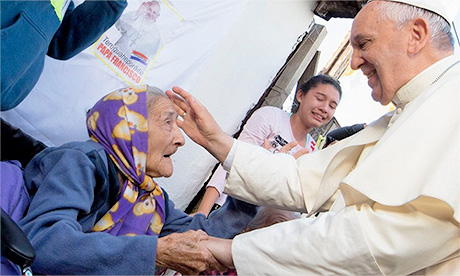A native-Spanish speaker who grew up with Italian-speaking relatives in Argentina, Pope Francis at five years has a striking way with words.
Bringing a background in literary themes and devices with him to the papacy five years ago, the pope has shown himself to be a master of metaphor and allegory.
His cross-cultural and eclectic knowledge of literature and cinema has supplied him with numerous visual elements that he mixes and matches with a religious message, creating such compound concoctions as “the babysitter church” to describe a parish that doesn’t encourage active evangelizers but only worries about keeping parishioners inside, out of trouble.
“Armchair Catholics,” meanwhile, don’t let the Holy Spirit lead their lives.
They would rather stay put, safely reciting a “cold morality” without letting the Spirit push them out of the house to bring Jesus to others.
The Ignatian spirituality that formed him as a Jesuit also comes through many of his turns of phrase.
Just as a Jesuit seeks to use all five senses to find and experience God, the pope does not hesitate to use language that involves sight, sound, taste, touch and smell.
And so he urges the world’s priests to be “shepherds living with the smell of sheep” by living with and among the people in order to share Christ with them, and he tells his cardinals that all Catholic elders need to share with the young their insight and wisdom, which become like “fine wine that tastes better with age.”
No chorus is as wonderful as the squeaks, squeals and banter of children, he once said before baptizing 32 babies in the Sistine Chapel, assuring the parents that the commotion and chaos of new life was not only welcome, but wonderful.
The pope’s visual vocabulary dips into the everyday with sayings and scenarios from daily routines: like sin being more than a stain; it is a rebellious act against God that requires more than just a trip “to the laundromat and have it cleaned.”
Even country living holds some lessons.
He once told parishioners to bother their priests like a calf would pester its mother for milk.
Always knock “on their door, on their heart so that they give you the milk of doctrine, the milk of grace and the milk of guidance.”
Food and drink hold numerous lessons.
For example, to convey the corrosive atmosphere a bitter, angry priest can bring to his community, the pope said such priests make one think, “This man drinks vinegar for breakfast. Then, for lunch, pickled vegetables. And, in the evening, a nice glass of lemon juice.”
Christians must not be boastful and shallow like a special sweet his Italian grandmother would prepare for Fat Tuesday, he has said.
Explaining how it is made from a very thin strip of pastry, the crunchy dessert bloats and swells in a pan of hot oil.
They are called “bugie” or “little lies,” he said, because “they seem big, but they have nothing inside, there’s no truth, no substance.”
Francis’ frequent focus on the evils of living a hypocritical or superficial life has meant employing descriptions such as showy as peacocks, frivolous as an over-primped star and fleeting as soap bubbles.
“A soap bubble is beautiful! It has so many colors! But it lasts one second and then what?” Continue reading
- Image: NCR
News category: Features.




